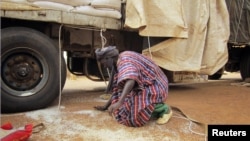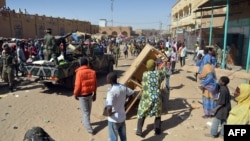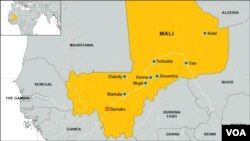DAKAR —
While residents of northern Mali celebrate the ouster of armed Islamist groups by French and Malian troops, they are concerned about dwindling food and fuel supplies in the wake of the offensive. Northerners and aid workers say it will be critical to ensure access to food and clean water to families in the regions, where conditions were already difficult.
Residents of Timbuktu could soon run out of safe drinking water, as fuel to power the city’s water system is dwindling.
That is part of the message Timbuktu resident Bilal Mahamane is bringing to the authorities in the capital, Bamako. With communications cut off after armed groups occupying the north reportedly cut mobile phone networks, Mahamane trekked for four days on foot, by boat, and by bus to Bamako to bring word of the worsening situation.
He says Timbuktu’s water supply system depends on fuel, and for the nine months the north has been occupied by armed groups, traders got fuel stocks from Algeria to the north. Now this has been cut off, he says, and there is just a small reserve of fuel left in Timbuktu.
Mahamane said traders who supplied Timbuktu with fuel and staple foods were mostly Arab and fled Timbuktu when fighting between the jihadist groups and the army began. After French and Malian troops entered Timbuktu on Tuesday some residents looted shops that were abandoned by their owners.
Aid workers say traders and livestock herders have also fled the northern town of Gao. Residents say Arab and Tuareg people in the region fear reprisal attacks by people who associate them with the Islamist groups.
The aid agency Oxfam says the latest events only exacerbate what was already a worrying food supply situation in Gao.
Food shortages that affected the entire Sahel region of West Africa in 2011 and 2012 had severely disrupted the flow of staple foods to northern Mali as early as October last year.
Philippe Conraud, Oxfam's acting director in Mali, says the situation in Gao is worrying as some 75 percent of the city's food shops and markets are now closed.
Conraud said a handful of traders are getting food to Gao via a road from Niger but it is not enough to meet the city’s and surrounding rural communities’ food needs. Oxfam says current stocks are expected to last only a few weeks.
One Gao man told VOA by phone that at the moment families there are using their food reserves.
For the food items like rice and oil still available in Gao, aid workers say prices have shot up by about 20 percent in just two weeks.
The United Nations humanitarian coordination agency, OCHA, says the U.N. is re-establishing a presence in the central Malian city of Mopti -- which was at the dividing line between the Malian army and the jihadist groups -- after having been evacuated when fighting erupted in early January.
OCHA says aid agencies are evaluating needs in the north, and coordinating with authorities in Niger to bring humanitarian supplies into northern Mali from there.
Residents of Timbuktu could soon run out of safe drinking water, as fuel to power the city’s water system is dwindling.
That is part of the message Timbuktu resident Bilal Mahamane is bringing to the authorities in the capital, Bamako. With communications cut off after armed groups occupying the north reportedly cut mobile phone networks, Mahamane trekked for four days on foot, by boat, and by bus to Bamako to bring word of the worsening situation.
He says Timbuktu’s water supply system depends on fuel, and for the nine months the north has been occupied by armed groups, traders got fuel stocks from Algeria to the north. Now this has been cut off, he says, and there is just a small reserve of fuel left in Timbuktu.
Mahamane said traders who supplied Timbuktu with fuel and staple foods were mostly Arab and fled Timbuktu when fighting between the jihadist groups and the army began. After French and Malian troops entered Timbuktu on Tuesday some residents looted shops that were abandoned by their owners.
Aid workers say traders and livestock herders have also fled the northern town of Gao. Residents say Arab and Tuareg people in the region fear reprisal attacks by people who associate them with the Islamist groups.
The aid agency Oxfam says the latest events only exacerbate what was already a worrying food supply situation in Gao.
Food shortages that affected the entire Sahel region of West Africa in 2011 and 2012 had severely disrupted the flow of staple foods to northern Mali as early as October last year.
Philippe Conraud, Oxfam's acting director in Mali, says the situation in Gao is worrying as some 75 percent of the city's food shops and markets are now closed.
Conraud said a handful of traders are getting food to Gao via a road from Niger but it is not enough to meet the city’s and surrounding rural communities’ food needs. Oxfam says current stocks are expected to last only a few weeks.
One Gao man told VOA by phone that at the moment families there are using their food reserves.
For the food items like rice and oil still available in Gao, aid workers say prices have shot up by about 20 percent in just two weeks.
The United Nations humanitarian coordination agency, OCHA, says the U.N. is re-establishing a presence in the central Malian city of Mopti -- which was at the dividing line between the Malian army and the jihadist groups -- after having been evacuated when fighting erupted in early January.
OCHA says aid agencies are evaluating needs in the north, and coordinating with authorities in Niger to bring humanitarian supplies into northern Mali from there.






